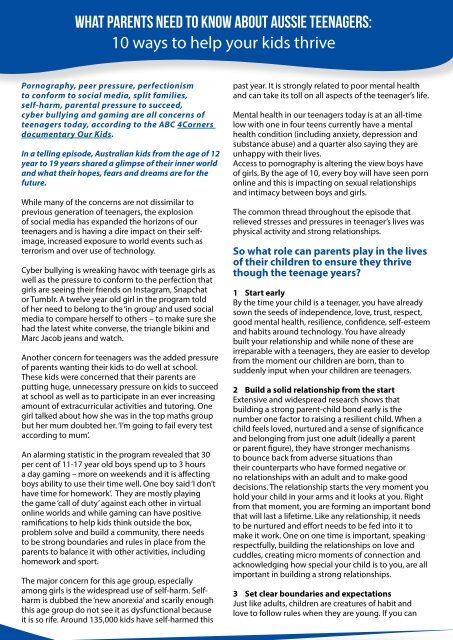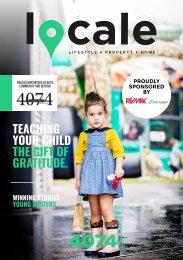Locale Hub 4074 - Issue 2
Locale 4074 Magazine - Jindalee, Middle Park, Mt Ommaney, Sinnamon Park, Westlake, Jamboree Heights
Locale 4074 Magazine - Jindalee, Middle Park, Mt Ommaney, Sinnamon Park, Westlake, Jamboree Heights
Create successful ePaper yourself
Turn your PDF publications into a flip-book with our unique Google optimized e-Paper software.
What Parents Need to Know about Aussie Teenagers:<br />
10 ways to help your kids thrive<br />
Pornography, peer pressure, perfectionism<br />
to conform to social media, split families,<br />
self-harm, parental pressure to succeed,<br />
cyber bullying and gaming are all concerns of<br />
teenagers today, according to the ABC 4Corners<br />
documentary Our Kids.<br />
In a telling episode, Australian kids from the age of 12<br />
year to 19 years shared a glimpse of their inner world<br />
and what their hopes, fears and dreams are for the<br />
future.<br />
While many of the concerns are not dissimilar to<br />
previous generation of teenagers, the explosion<br />
of social media has expanded the horizons of our<br />
teenagers and is having a dire impact on their selfimage,<br />
increased exposure to world events such as<br />
terrorism and over use of technology.<br />
Cyber bullying is wreaking havoc with teenage girls as<br />
well as the pressure to conform to the perfection that<br />
girls are seeing their friends on Instagram, Snapchat<br />
or Tumblr. A twelve year old girl in the program told<br />
of her need to belong to the ‘in group’ and used social<br />
media to compare herself to others – to make sure she<br />
had the latest white converse, the triangle bikini and<br />
Marc Jacob jeans and watch.<br />
Another concern for teenagers was the added pressure<br />
of parents wanting their kids to do well at school.<br />
These kids were concerned that their parents are<br />
putting huge, unnecessary pressure on kids to succeed<br />
at school as well as to participate in an ever increasing<br />
amount of extracurricular activities and tutoring. One<br />
girl talked about how she was in the top maths group<br />
but her mum doubted her. ‘I’m going to fail every test<br />
according to mum’.<br />
An alarming statistic in the program revealed that 30<br />
per cent of 11-17 year old boys spend up to 3 hours<br />
a day gaming – more on weekends and it is affecting<br />
boys ability to use their time well. One boy said ‘I don’t<br />
have time for homework’. They are mostly playing<br />
the game ‘call of duty’ against each other in virtual<br />
online worlds and while gaming can have positive<br />
ramifications to help kids think outside the box,<br />
problem solve and build a community, there needs<br />
to be strong boundaries and rules in place from the<br />
parents to balance it with other activities, including<br />
homework and sport.<br />
The major concern for this age group, especially<br />
among girls is the widespread use of self-harm. Selfharm<br />
is dubbed the ‘new anorexia’ and scarily enough<br />
this age group do not see it as dysfunctional because<br />
it is so rife. Around 135,000 kids have self-harmed this<br />
past year. It is strongly related to poor mental health<br />
and can take its toll on all aspects of the teenager’s life.<br />
Mental health in our teenagers today is at an all-time<br />
low with one in four teens currently have a mental<br />
health condition (including anxiety, depression and<br />
substance abuse) and a quarter also saying they are<br />
unhappy with their lives.<br />
Access to pornography is altering the view boys have<br />
of girls. By the age of 10, every boy will have seen porn<br />
online and this is impacting on sexual relationships<br />
and intimacy between boys and girls.<br />
The common thread throughout the episode that<br />
relieved stresses and pressures in teenager’s lives was<br />
physical activity and strong relationships.<br />
So what role can parents play in the lives<br />
of their children to ensure they thrive<br />
though the teenage years?<br />
1 Start early<br />
By the time your child is a teenager, you have already<br />
sown the seeds of independence, love, trust, respect,<br />
good mental health, resilience, confidence, self-esteem<br />
and habits around technology. You have already<br />
built your relationship and while none of these are<br />
irreparable with a teenagers, they are easier to develop<br />
from the moment our children are born, than to<br />
suddenly input when your children are teenagers.<br />
2 Build a solid relationship from the start<br />
Extensive and widespread research shows that<br />
building a strong parent-child bond early is the<br />
number one factor to raising a resilient child. When a<br />
child feels loved, nurtured and a sense of significance<br />
and belonging from just one adult (ideally a parent<br />
or parent figure), they have stronger mechanisms<br />
to bounce back from adverse situations than<br />
their counterparts who have formed negative or<br />
no relationships with an adult and to make good<br />
decisions. The relationship starts the very moment you<br />
hold your child in your arms and it looks at you. Right<br />
from that moment, you are forming an important bond<br />
that will last a lifetime. Like any relationship, it needs<br />
to be nurtured and effort needs to be fed into it to<br />
make it work. One on one time is important, speaking<br />
respectfully, building the relationships on love and<br />
cuddles, creating micro moments of connection and<br />
acknowledging how special your child is to you, are all<br />
important in building a strong relationships.<br />
3 Set clear boundaries and expectations<br />
Just like adults, children are creatures of habit and<br />
love to follow rules when they are young. If you can
















